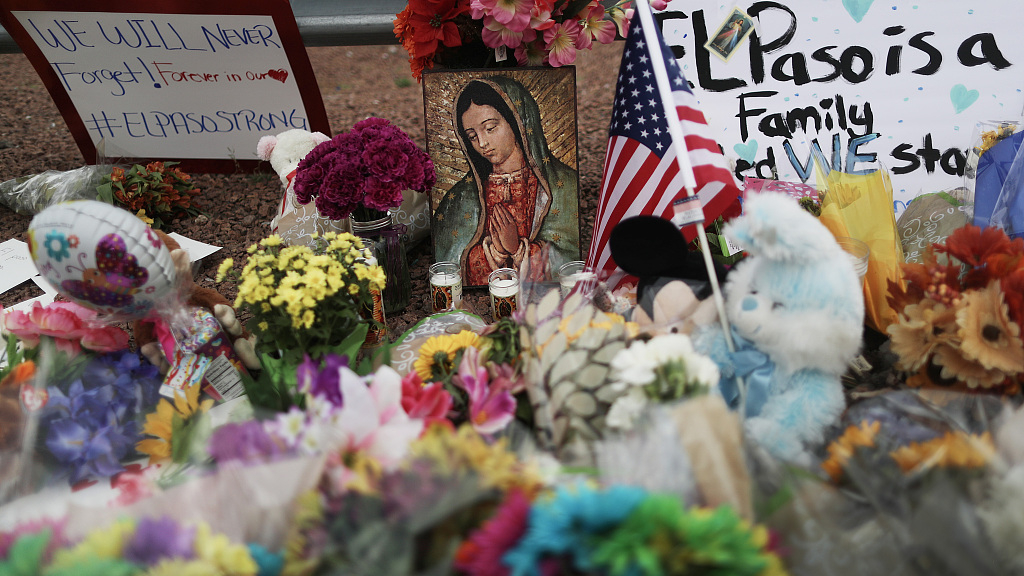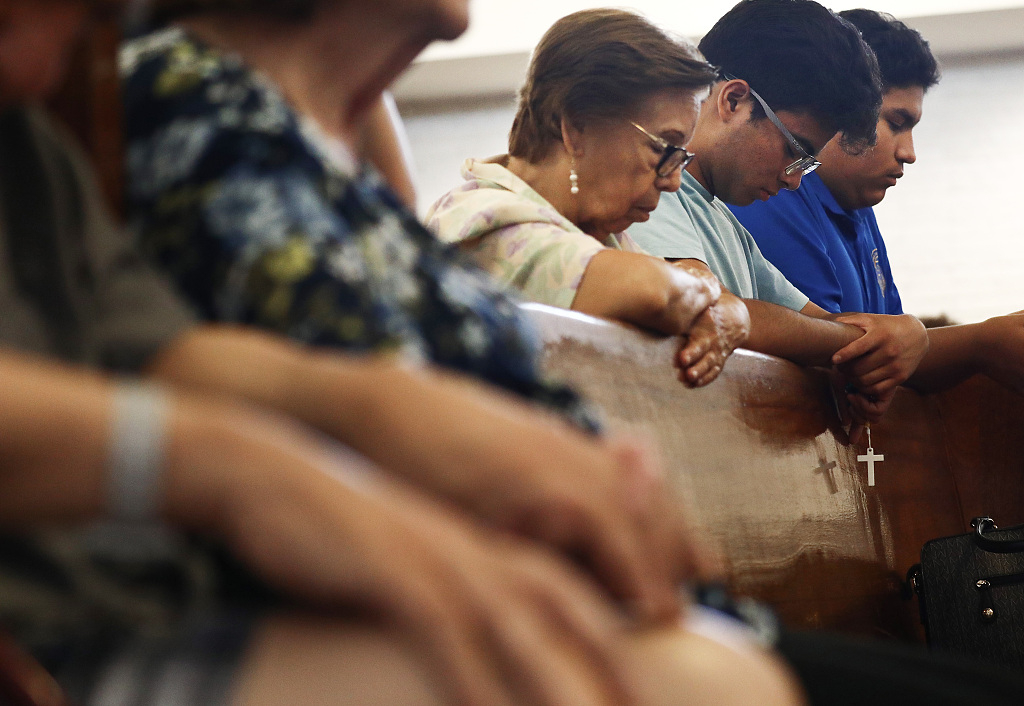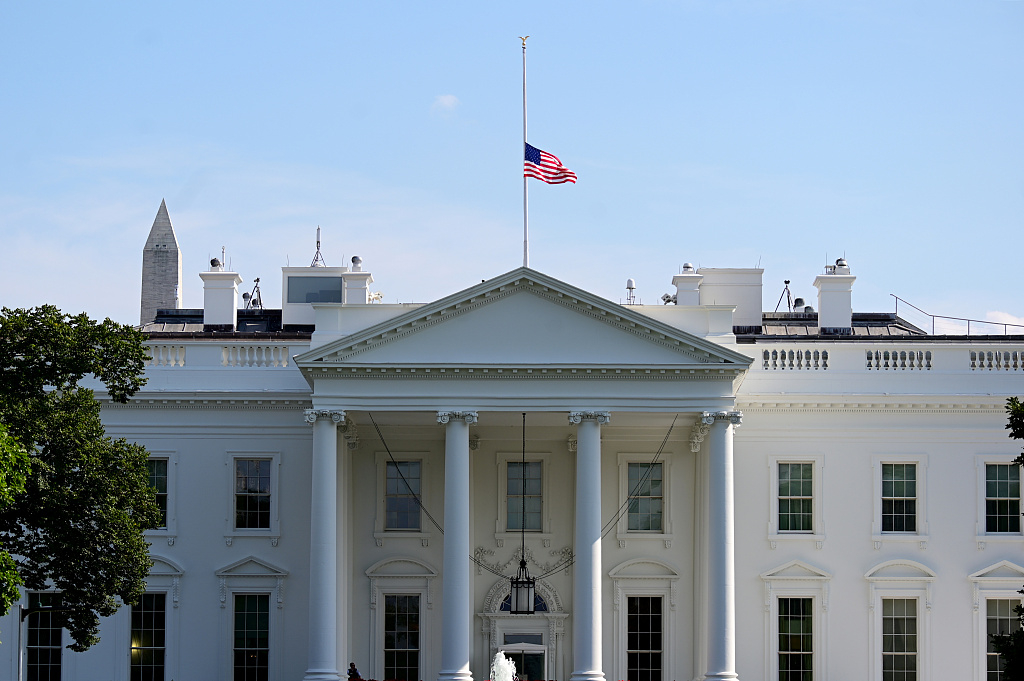

Editor's Note: Tom Fowdy is a British political and international relations analyst and a graduate of Durham and Oxford universities. He writes on topics pertaining to China, the DPRK, Britain, and the United States. The article reflects the author's opinions and not necessarily the views of CGTN.
The United States has been rocked in the past 24 hours by back to back mass shootings in El Paso, Texas and Dayton, Ohio. The two attacks, staged against a Wallmart supermarket and a local nightclub, have killed 29 people, including the sister of one of the shooters. Whilst the motives of the Dayton attack are not yet clear, the El Paso shootings are being described as an act of white supremacist terrorism, with the alleged shooter having released a “manifesto” whereby he decried a “cultural and ethnic replacement brought on by an invasion” by Hispanics in the United States, El Paso being a city on the border with Mexico with a prominent Latino community.
In response to the attacks, President Trump stated that “perhaps more needs to be done” and “hate has no place in our country!” However, he reduced the motivations behind the attacks to “mental illness” and then said he would be “praying for all those impacted by this unspeakable act of evil!” In substance, he did not appear to be pledging anything new or unconventional towards America’s longstanding problem of mass shootings, nor for the fact addressing the fact that his own political platform may be contributing to people’s motivations to pursue violence.

People attend a prayer vigil at Blessed Sacrament Catholic Church for victims of a mass shooting, which left at least 20 people dead in El Paso, Texas, U.S., August 4, 2019. /VCG Photo
Given this, one must question what will it take for America to come to terms with its gun problem? What we see here is not something new, unprecedented or even remarkable for the U.S, but something which has disturbingly became routine and normalized. Year upon year mass shootings continue to claim hundreds of innocent lives and yet authorities continue to stubbornly resist change, with munitions not only forming a commercial interest group which continues to hold a pistol to the head of politicians but also sustaining itself as an integral element of American conservative identity. Change is desperately needed, but there is no sign it is coming anytime soon.
Why do some Americans express a religious-like devotion to guns? The very presence of the Second Amendment to the U.S constitution, which states “the right of the people to keep and bear Arms, shall not be infringed” offers insight into how the aspect of firearms built itself into American political identity. With the United States being the world’s earliest bourgeois society, dominated by a class of landowners, the right to the firearm was seen as integral to protecting their right to property and thus “liberty” against external interference, not least of course on the background of resistance to British autocracy.
However, times, of course, change. America, as we know it today, is not a 19th-century agrarian society, but an industrialized and urbanized state with social and economic problems that did not exist in that era. This means that unlike that time, guns do not purely exist as a connotation to every person’s bid to defend his or her property, but have become propagators of violence and crime. Despite this, the U.S constitution has stood relatively still on the matter, with American conservatives fiercely defending the Second Amendment as a component of their national belonging.

The United States flag flies at half staff above the White House in response to the El Paso and Dayton mass shooting attacks in Washington, USA, August 4, 2019. /VCG Photo
This has of course been infamously buoyed up by what is known as the “Gun Lobby,” with the National Rifle Association (NRA) posing as a façade for munitions companies exerting influence and pressure over politicians to resist arms control legislation. Rather than address the fact that guns have been an enabler of mass shootings, they have infamously recommended “More guns” as the answer to any problems. Thus, while any other western country responded to mass shootings with punitive arms control measures (such as New Zealand early this year), Washington has stood still.
Despite the events of the past 24 hours, don’t expect that to change anytime soon. As a Republican President, the last thing Donald Trump is about to do is to get serious on arms control. The White House has in practice been a massive supporter of the American arms industry, illustrated by his willingness to sell large amounts of U.S arms abroad, such as to Saudi Arabia. Being extensively focused on American jobs and manufacturing, there is zero likeliness that he would impose federal bans on any kind of weapon being sold in American stores. Thus when he states he is “praying” for the victims, he is, of course, paying lip service to the usual response to mass shootings, to do nothing and hope for the best.
Given this, just what will it take for the U.S to come to terms with guns? For sure this is far from the first mass shooting America has experienced and most terrifyingly, it is certainly far from the last too. It is easy to scapegoat “mental illness” for the sporadic violence, but this like everything else is refusing to see the wood for the trees. Politicians continue at large to talk about everything and everything but the real problem.
(If you want to contribute and have specific expertise, please contact us at opinions@cgtn.com.)

Copyright © 2018 CGTN. Beijing ICP prepared NO.16065310-3
Copyright © 2018 CGTN. Beijing ICP prepared NO.16065310-3